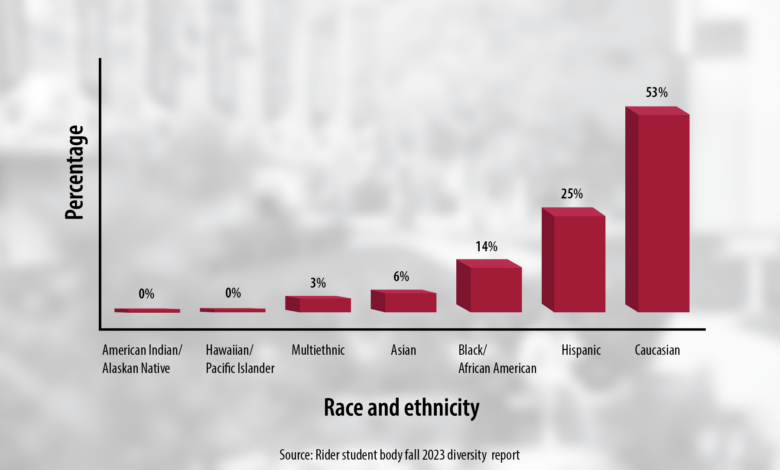
Rider reports 0% for American Indian students
By Grace Bertrand
With a total of 65 countries represented in Rider’s student body, the university is widely acknowledged for its diversity.
However, Rider’s fall 2023 diversity report showed 0% representation for the American Indian demographic in Rider’s student body.
“We’re not targeting students of a specific ethnicity or race group,” said Heeyoung Kim, chief diversity officer of the Center for Diversity and Inclusion. “We just generally welcome everybody.”
In June 2023, the Supreme Court passed a ban on race-based affirmative action, meaning colleges can no longer consider race and ethnicity when admitting students.
As a result, Rider saw demographic changes in students of color, similar to many universities across the country.
“From an admissions perspective, we are essentially evaluating students based on their academic ability to be enrolled at the institution,” said Drew Aromando, vice president of enrollment engagement.
Aromando said, because of the United States Supreme Court decisions, Rider no longer has restrictions or classified approaches to building a class based on race, gender or ethnic background, calling it “a good thing.”
“It allows us to really be as diverse as possible within our populations,” said Aromando. “The flip side of that is we also aren’t able to control any particular race or gender from really being high volume or low volume.”
Less than 1%
Kim believes the low population of American Indians at Rider is due to fewer people choosing to identify as a part of the ethnic group because they share mixed ethnicities. According to the 2020 U.S. Census, only 0.7% of the population identifies as Native American in New Jersey.
“We are seeing less and less of one ethnicity or race group,” said Kim. “We might have a student who is actually of that ethnicity, but they don’t feel out as Native American.”
Kim explained that, unless the students feel comfortable telling people themselves, asking about who their ancestors are is extremely inappropriate, calling it “the biggest microaggression.”
Rider alum Tristan Leach ’24, who identifies as a partially Alaskan Native, said the low population of American Indians and Alaskan Natives in New Jersey is “not surprising.”
“Alaska is a very hard state to get out of,” said Leach. “Because of how America was colonized, a lot of Native American peoples have been forced out of their homes and they now live in a place that they were told by the government was home.”
Graduating in May 2024, Leach was part of the 0% demographic on campus at the time of the fall 2023 report and was likely sharing that percentage with less than five other people. When applying to Rider, Leach, who goes by they/she pronouns, said they had identified as White, Alaskan Native and Filipino.
“I put those down on my application because I feel like it’s validating to be honest about yourself, and I know it affects how Rider looks,” said Leach. “It’s really nice when a college or university has a very diverse population because, for centuries, college was meant for white men.”
With an increasing number of people identifying as more than one ethnicity or race, Leach explained how important it is for universities to be engaging with as many ethnic groups as possible to foster a more inclusionary educational system.
“It’s super important for all higher education institutions and organizations to acknowledge where we’re falling behind in representation,” said Leach. “It’s to show that there’s still so much further that we can go and that we should all be branching out and allowing higher education to be made to everyone who not only wants it, but needs it.”
‘As inclusive as can be’
While finding representation on campus is not as difficult as it once was, minority groups still find themselves struggling to build a community on a college campus.
Leach explained that during their time here at Rider, they still found it hard to find and connect with people who also identified as Native American as strongly as they did.
“Even if something had been set up for native people when I was there, who’s to say it would still be there if there was no representation to keep it grounded,” said Leach.
Despite a lack of American Indian and Alaskan Native demographic on campus, the CDI will be hosting an event for National Native American Heritage Month on Nov. 20 called “Dance, Drum and Dialogue.”
November is Native American Heritage Month, and to recognizes American Indians across the country while embracing their cultural experiences.
Aromando emphasized the importance of building a community where students are learning from more than just classroom experiences at Rider.
“I think it is one of the greatest things to have a strongly diverse enrollment population, and it helps people learn about each other’s backgrounds and interests,” said Aromando.
Looking ahead to where Rider will be in terms of diversity in the future, Aromando said he is in favor of the “full, holistic community approach” Rider is taking and feels that it’s been working for them.
“We’re already as inclusive as you can possibly be,” said Aromando.


